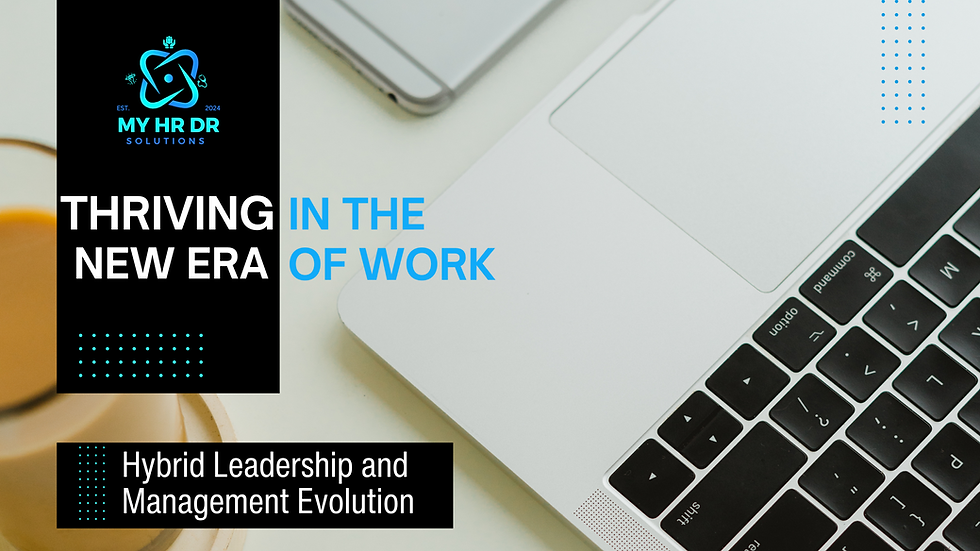Hybrid Leadership and Management Evolution: Thriving in the New Era of Work
- Dr. Megan
- Aug 12, 2025
- 3 min read

Hybrid Leadership and Management Evolution: Thriving in the New Era of Work
The workplace has changed forever—and so has the role of leadership. As hybrid work becomes the norm, traditional management styles based on in-person oversight simply don’t cut it anymore. Today’s leaders must embrace hybrid leadership skills to succeed across digital, remote, and in-person environments.
Yet, according to Gartner, 73% of HR leaders say their managers aren’t equipped to lead through change. Meanwhile, middle managers are burning out faster than any other employee group.
At My HR Doctor Solutions, we help organizations navigate this shift by equipping managers with the tools, mindset, and support they need to lead confidently in a distributed team leadership model. From asynchronous collaboration to building culture across screens, let’s dive into how modern leadership is evolving—and what your organization can do to stay ahead.
The Problem: Management Playbooks Are Outdated
Today’s managers face a new reality: leading people they may rarely see in person, across time zones, using tools that didn’t exist a few years ago. But many companies are still relying on outdated models that don’t account for remote team management complexities.
Common challenges include:
Micromanagement disguised as check-ins
Lack of visibility into team morale and workload
Unequal opportunities for remote vs. in-office employees
Inconsistent performance evaluations and unclear expectations
Without proper support, managers are stretched thin. They’re expected to deliver results, maintain culture, and support well-being—all while adapting to unfamiliar tools and working styles.
This leadership gap can lead to poor engagement, high turnover, and lost productivity across the board.
The Solution: Equip Managers for Hybrid Success
The key to solving these challenges lies in upskilling managers and redesigning leadership frameworks to fit the hybrid age.
Here’s how successful organizations are empowering managers:
Focus on Outcomes, Not Activity
Effective hybrid leaders trust their teams and measure results, not screen time.
Benefits:
Empowers employees to manage their time
Increases autonomy and satisfaction
Shifts focus to meaningful performance metrics
Managers should learn to evaluate output using project milestones, deliverables, and employee-defined goals—ideal for distributed team leadership.
Provide Targeted Manager Training Programs
Generic leadership training no longer works. Modern companies offer tailored manager training programs that address:
Leading with empathy in digital environments
Managing asynchronous work and digital fatigue
Building inclusive, psychologically safe virtual spaces
Giving effective feedback without physical presence
These programs foster confidence and consistency among your management team.
Leverage Technology to Enhance, Not Replace, Human Connection
Leaders must embrace the right tools for remote team management, but tech should never substitute for empathy.
Smart strategies:
Use collaboration platforms (e.g., Slack, Asana, MS Teams) to maintain visibility
Set up structured 1:1s and team check-ins
Use pulse surveys and feedback loops to stay attuned to morale
Automation can handle reporting and workflows—freeing leaders to focus on coaching and culture.
Adopt the Player-Coach Model
The most effective hybrid managers act as player-coaches—contributing their own work while mentoring their team.
Why it works:
Keeps leaders close to day-to-day challenges
Builds credibility and trust
Encourages a growth mindset across the team
This model is especially effective in industries with evolving needs, such as tech, healthcare, and professional services.
The Impact: More Resilient, Engaged Teams
When managers adapt to hybrid leadership, the results are transformative:
Increased employee engagement: Teams feel seen, supported, and motivated—even at a distance.
Lower burnout rates: Flexible schedules and clear expectations reduce stress for everyone, especially middle managers.
Higher innovation: Psychological safety empowers employees to share bold ideas without fear of judgment.
Better retention: Employees are more likely to stay with leaders who invest in their growth and well-being.
Organizations that embrace virtual leadership development are not just surviving—they're thriving.
Industry Context: Why Hybrid Leadership Matters Now
The hybrid model is here to stay. Research shows that over 60% of knowledge workers prefer hybrid work—and organizations must evolve or risk falling behind.
Key trends driving leadership transformation:
Increased reliance on asynchronous communication
Rise in digital collaboration platforms
Demand for inclusive, equitable work environments
Globalization of talent across borders
As industries shift toward flexible work—whether in professional services, technology, or remote-first startups—hybrid leadership skills are no longer optional. They’re essential to competitiveness, innovation, and employee satisfaction.
Call to Action: Invest in the Leaders Who Drive Your Business
Your managers are the backbone of your organization. Don’t leave them behind in the shift to hybrid work.
At My HR Doctor Solutions, we provide custom-built manager training programs that empower leaders with the tools they need to excel in today’s distributed world. From workshops to coaching, we help transform management into a strategic advantage.
Ready to upskill your leaders for hybrid success? Visit us at https://www.myhrdoc.net to learn more.
.png)